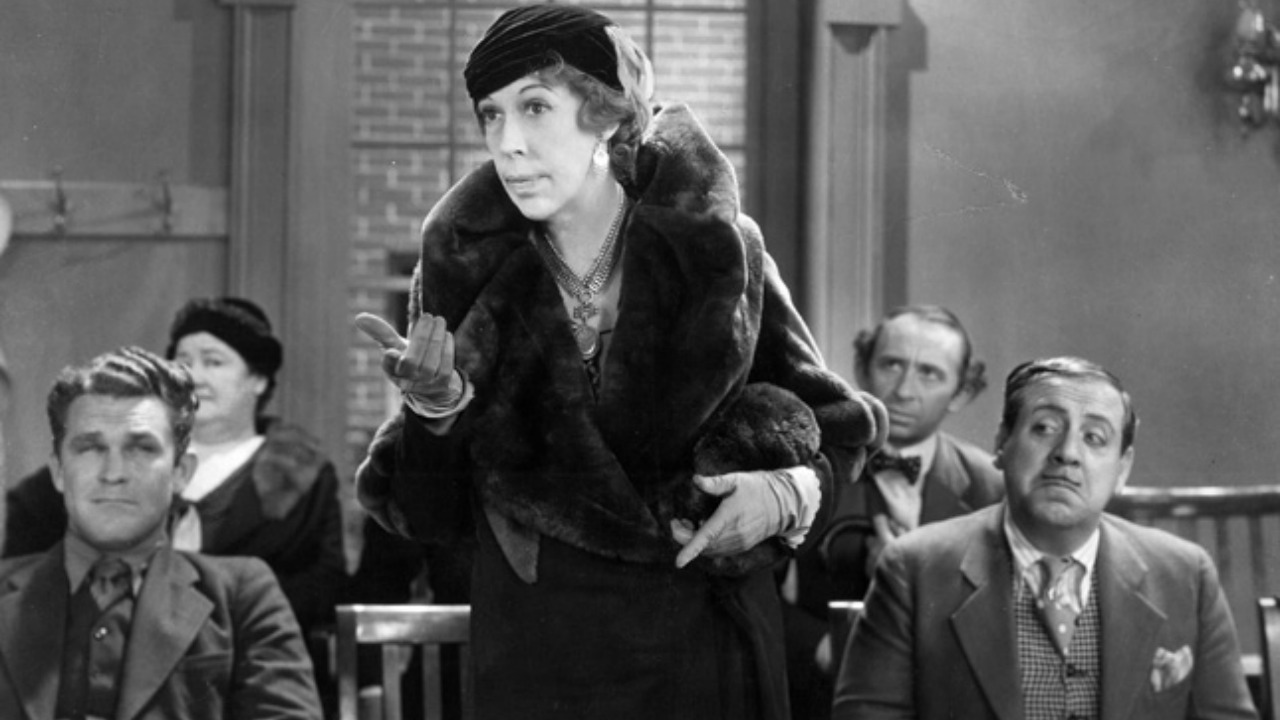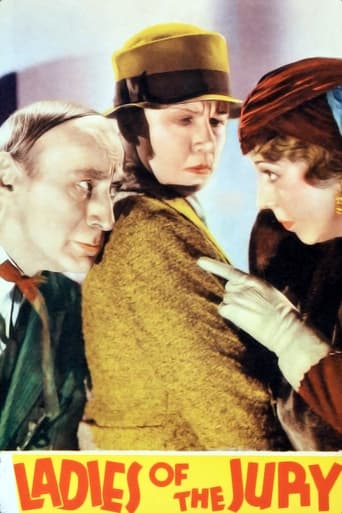

That first part is a real hoot. Society matron Oliver is used to having her own way. So when she enters the rule-bound courtroom as a juror, the judge is driven to distraction. Oliver's superb, amusing rather than dislikable as she disrupts the constrained proceedings with her constant remarks. Thus, it's a high society presumptions versus a frazzled judge and the court's rules. So did Mrs. Gordon (Esmond) murder her husband or not. With one exception, the jury thinks so, and we know who the exception is. But how long can Oliver hold out. Here the movie reminds me of that heavy 1957 courtroom melodrama 12 Angry Men. Except this is done for comedic effect with an array of jury characters—the blonde chippie and her glandular admirer, a wisecracking Ken Murray, a stuttering Roscoe Ates, et al. The script includes some snappy lines and an occasional pre-Code innuendo. Note too, the gender-bending woman in a man's suit who's also a prude. And even though the dialogue seldom pauses, there's little action, while events themselves are pretty much confined to two courtroom sets. All in all, it's an entertaining programmer with a lot of character color, but not much diversion for the eye.
... View MoreIn New Jersey, hidden from camera range, ex-chorus girl Jill Esmond (as Yvette Gordon) kills her husband. She is charged with murder, but claims the gun went off accidentally. The case goes to jury trial. Despite being pushy and over-talkative, wealthy society matron Edna May Oliver (as Mrs. Crane) is accepted as a juror. She creates chaos in the courtroom. As you will surely guess, Ms. Oliver has a contrary opinion in the deliberation room. Oliver would be more amusing if the comedy worked. For example, have Oliver blurt out a question from the jury box and be overruled; an Oliver muttering and mugging after being scolded would be funnier. This was based on a play, so RKO and director Lowell Sherman presumably adhered to the original. It was titled "Ladies of the Jury" too, despite having a jury consisting of both "ladies and gentlemen." A better title would have been "Lady of the Jury", although even that is a judgment call.**** Ladies of the Jury (2/5/32) Lowell Sherman ~ Edna May Oliver, Jill Esmond, Helene Millard, Leyland Hodgson
... View MoreLadies of the Jury (1932) *** (out of 4) Interesting comedy with just a pinch of drama. A chorus girl is accused of murdering her much older husband so that she can get his money. Eleven people of the jury thinks she's guilty but one (Edna May Oliver) believes that there isn't a way she did the crime due to a questionable witness at the trial. Sound familiar to a certain Henry Fonda movie called 12 ANGRY MEN? This film was based on a Broadway play and there's no question that it has a lot of strong connections to the much more famous Fonda film. I can't go into any real detail as it would provide spoilers for both films but it was rather funny seeing how many characters shared some similarities as well as reasons why those thinking the woman is guilty switch sides and go for not guilty. Fans of 12 ANGRY MEN will certainly get an added kick out of this film but even on its own this thing isn't too bad. I think what's most interesting is that the first thirty-five minutes is pure comedy as we're in the court room as the evidence is given and all hell is constantly breaking loose. This includes the lawyers fighting each other, the suspect constantly screaming at the witness and of course there's Edna May Oliver who is constantly jumping up to ask her own questions of the witnesses. A lot of the comedy is very forced and over the top but most of it works. It even works when we get to the jury room where more craziness follows including jurors falling in love and of course more fighting. While there's a lot of over-the-top moments, the film actually takes the case rather serious and keeps the mystery going right up until the ending. I think it was a rather interesting move keeping the dramatic side of the case strong and it makes for a rather unique experience since most films would either go for all laughs or all drama. A big reason this film works are the performances with Oliver really delivering the goods in the main role. She's perfectly believable as the rich woman who gets her way and will let no one tell her how to do things. The supporting actors are quite strong as well with Jill Esmond (who was married to Laurence Olivier at the time), Ken Murray, Kitty Kelly, Cora Witherspoon and Robert McWade all doing fine work. We even get some very funny moments from stutterer Roscoe Ates who is best remembered for his role in FREAKS. At just 63-minutes this thing flies by and is certainly worth checking out when it shows up on TCM.
... View MoreIt's too bad that real trials aren't like the one depicted in this film. The trial and jury deliberations shown in this film are completely unrealistic, but what does that have to do with good movie making? I love Edna May Oliver's rendition in the Hildegard Withers series, which this film is NOT part of. It is, however, a worthy precursor of her later sleuthing roles.The film is something of a comic version of 12 Angry Men. A single juror votes not guilty, then, using appeals to the prejudices and passions of the other jurors more than reason, persuades other jurors to change their vote to "Not Guilty" until the final scene where the innocence of the accused is "proved". A fast wrap up has the jury declaring, in voice over on the end credit, that they find the defendant "Not Guilty".You won't find realistic situations anywhere in this film. What you will find is an acting tour de force by Edna May Oliver, excellent characterizations by the rest of the cast, an excellent period piece of the early 1930's.This is not a film for everyone. It is a film for true cinephiles. Not a classic, but a classic example of early talkies.I'm sorry I could not explain it's appeal better, but it's appeal is ephemeral. Good acting, good humor, good story - good, good, good. Good enough to make it's flaws worth ignoring.
... View More